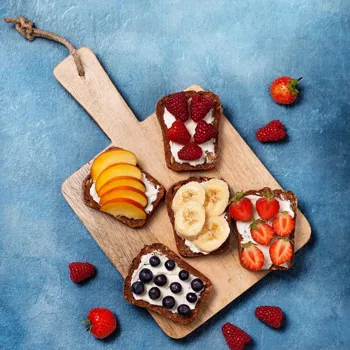Unlock the Power of Nutrition for Optimal Energy Levels! Dive into 10 Vital Facts for a Vibrant Life!
Namaste, doston! Feeling a bit low on energy lately? Dragging yourself through the day like a rickshaw
puller in peak summer? Well, before you blame it all on the weather or the workload, let's talk about something super important: nutrition!
What you put inside your body has a massive impact on how much energy you have. It's like putting petrol in your car – good stuff, and you zoom; bad stuff, and you’re sputtering down the road.
We’ve all been there, right?
That afternoon slump after a heavy lunch, or that constant feeling of tiredness even after a seemingly good night’s sleep. Often, the solution isn't more coffee (though chai is definitely acceptable!), but a closer look at your diet.
So, let's dive into 10 facts about the link between nutrition and energy levels that every Indian needs to know! Get ready to learn, and get ready to feel the power of proper nutrition!
Fuel Up with Complex Carbs, Not Simple Ones:
Think of carbohydrates as your body's primary source of fuel. But not all carbs are created equal, bhai!
Simple carbohydrates, found in things like white bread, sugary drinks, and processed snacks, give you a quick burst of energy, followed by a crash that leaves you feeling even more tired than before. These are quickly digested, causing a rapid spike and then a dip in blood sugar levels.
This rollercoaster ride is exactly what we want to avoid.
Complex carbohydrates, on the other hand, are your steady-energy champions! Found in whole grains like brown rice, oats, and whole wheat roti, as well as in vegetables and legumes, complex carbs take longer to digest.
They provide a slow and sustained release of energy, keeping you feeling full and energized for longer. So, swap that white bread for whole wheat, ditch the sugary drinks for water, and load up on those veggies and dals! Your body will thank you for it.
Opting for complex carbs also helps stabilise blood sugar levels, preventing those energy crashes that can derail your day. It's a simple switch that can make a HUGE difference to your overall energy and well-being. Remember: steady energy is key to conquering your day!
Protein Power for Sustained Energy:
Protein isn't just for building muscles, it’s also a vital player in maintaining energy levels throughout the day. Protein-rich foods take longer to digest than carbohydrates, which means they provide a more sustained release of energy and help prevent blood sugar spikes and crashes.
Including a source of protein in each meal can help keep you feeling full and energized for hours. Think of protein as the anchor that keeps your energy levels stable.
Good sources of protein include lentils (dals of all kinds!
), chickpeas (chole), kidney beans (rajma), tofu, paneer, nuts, and seeds. Adding a handful of nuts to your breakfast, a bowl of dal to your lunch, or some tofu to your stir-fry for dinner can make a significant difference in your energy levels.
Combining protein with complex carbohydrates is a winning strategy for sustained energy. For example, having dal and roti together provides both the slow-releasing energy of complex carbs and the sustained energy of protein.
This combination helps to keep you feeling full, energized, and focused for longer.
Don't Fear the (Healthy) Fats:
Fat often gets a bad rap, but healthy fats are essential for overall health and play a role in energy production. Healthy fats help your body absorb essential vitamins and minerals, which are crucial for energy metabolism.
They also provide a concentrated source of energy that can be used when your body needs it. Just remember, not all fats are created equal. Avoid trans fats found in processed foods and opt for healthy fats instead.
Good sources of healthy fats include nuts like almonds and walnuts, seeds like chia and flax seeds, avocados, and olive oil. Adding a sprinkle of seeds to your morning poha or a handful of nuts as an afternoon snack can provide a boost of energy and keep you feeling satisfied.
Healthy fats also support hormone production, which is vital for regulating energy levels and mood. So, don't be afraid to incorporate healthy fats into your diet. They're your allies in the fight against fatigue! Just remember to consume them in moderation, as they are still calorie-dense.
Hydration is Key, Boss!
Dehydration is a sneaky energy thief! Even mild dehydration can lead to fatigue, headaches, and decreased concentration. Water is essential for virtually every bodily function, including energy production.
When you're dehydrated, your body has to work harder to carry out these functions, leaving you feeling tired and sluggish. Make sure you're drinking enough water throughout the day, especially in the hot Indian climate.
Aim for at least 8 glasses of water a day, and more if you're active or sweating a lot. Carry a water bottle with you and sip on it throughout the day. You can also get hydration from fruits and vegetables with high water content, such as watermelon, cucumbers, and spinach.
Hydration isn't just about drinking water; it's about maintaining the right balance of fluids in your body. This balance is crucial for optimal energy levels and overall well-being. So, stay hydrated, and stay energized!
Iron Deficiency? No, Thank You!
Iron deficiency is a common cause of fatigue, especially in women. Iron is essential for carrying oxygen throughout your body, and when you're deficient, your cells don't get enough oxygen, leading to tiredness and weakness.

Iron deficiency is a common condition, and it can have a significant impact on your energy levels. If you suspect you might be iron deficient, it's important to get your levels checked by a doctor.
Include iron-rich foods in your diet, such as spinach, lentils, chickpeas, and fortified cereals.
Eating these foods helps you regain the iron deficiency and thus, maintain a healthy lifestyle.
Vitamins and Minerals: The Energy Superstars:
Vitamins and minerals are essential for energy metabolism. They act as coenzymes, helping your body convert food into energy. Deficiencies in certain vitamins and minerals, such as vitamin B12, vitamin D, and magnesium, can lead to fatigue and low energy levels.
A well-balanced diet rich in fruits, vegetables, and whole grains should provide you with most of the vitamins and minerals you need.
Consider taking a multivitamin if you're concerned about deficiencies, but always talk to your doctor first.
Vitamin B12 is particularly important for energy production and nerve function. It's primarily found in animal products, so vegetarians and vegans may need to supplement. Vitamin D is essential for bone health and immune function, and it also plays a role in energy levels.
Many people are deficient in vitamin D, especially those who spend most of their time indoors. Magnesium is involved in hundreds of biochemical reactions in the body, including energy production. It can be found in nuts, seeds, and leafy green vegetables.
Don't Skip Breakfast, Ever!
Breakfast is the most important meal of the day, as they say! It sets the tone for your energy levels for the rest of the day. It kickstarts your metabolism and provides your brain and body with the fuel they need to function optimally.

Skipping breakfast can lead to low blood sugar levels, which can result in fatigue, irritability, and difficulty concentrating.
Opt for a breakfast that includes complex carbohydrates, protein, and healthy fats.
Some good options include oatmeal with nuts and seeds, whole wheat toast with avocado, or a bowl of dal with roti. A healthy breakfast will provide you with sustained energy throughout the morning and prevent those mid-morning crashes.
Starting your day with a nutritious meal is like starting your day with a full tank of fuel. It sets you up for success and helps you maintain your energy levels throughout the day.
Avoid Processed Foods and Sugary Drinks:
Processed foods and sugary drinks are energy zappers! They often contain refined carbohydrates, unhealthy fats, and artificial ingredients that can lead to energy crashes and inflammation. These foods provide empty calories, meaning they offer little to no nutritional value.
They can also disrupt your blood sugar levels, leading to energy highs and lows.
Limit your consumption of processed foods, sugary drinks, and refined carbohydrates. Opt for whole, unprocessed foods instead.
Making this simple switch can have a dramatic impact on your energy levels and overall health. Processed foods and sugary drinks are often loaded with additives and preservatives that can interfere with your body's natural energy production processes.
They can also contribute to weight gain, which can further reduce your energy levels.
Eat Regularly Throughout the Day:
Skipping meals or going too long between meals can lead to low blood sugar levels and fatigue. Eating regularly throughout the day helps to keep your blood sugar levels stable and provides your body with a consistent supply of energy.
Aim to eat every 3-4 hours, including three main meals and a couple of healthy snacks. Regular eating also helps to prevent overeating at mealtimes, which can lead to sluggishness and fatigue.
Healthy snack options include fruits, vegetables with hummus, a handful of nuts, or a yogurt.
Planning your meals and snacks in advance can help you stay on track and avoid unhealthy temptations. Keeping a supply of healthy snacks on hand can also help you avoid those mid-afternoon energy crashes. Eating regularly is like refueling your car throughout a long journey.
It keeps you going strong and prevents you from running out of gas.
Listen to Your Body, Yaar!
Everyone's nutritional needs are different. Pay attention to how different foods make you feel and adjust your diet accordingly. Some foods may give you a boost of energy, while others may leave you feeling tired and sluggish.
Keeping a food journal can help you identify trigger foods and make informed choices about your diet.
Experiment with different foods and combinations to find what works best for you. Don't be afraid to ask for help from a registered dietitian or nutritionist.
They can provide personalized advice and help you create a meal plan that meets your individual needs. Ultimately, the best diet is one that is sustainable, enjoyable, and provides you with the energy you need to live your life to the fullest.
Listen to your body's wisdom; it knows what it needs to thrive.
Alright, folks! There you have it – 10 essential facts about the link between nutrition and energy levels. Implement these simple tips into your daily routine, and you'll be amazed at the difference it makes.
Stay healthy, stay energized, and stay awesome!
AI Generated Content. Glance/InMobi shall have no liability for the content



















